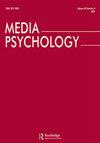#MeToo运动的反弹:对女性倡导者更“性别歧视”的评价如何削弱了运动的支持
IF 2.6
2区 心理学
Q1 COMMUNICATION
引用次数: 1
摘要
摘要在反对性骚扰和性侵犯运动兴起之际,人们质疑男性是否可能将这种激进主义视为对其生计和男性地位的威胁。这项研究探讨了支持#MeToo推文的接收可能会因信使的社会身份而有所不同。这项针对白人男性(N=421)的在线调查实验考察了信使性别(男性或女性)和种族(黑人或白人)对信使感知以及随后的运动态度和行为意图的影响。结果显示,白人男性发现女性#MeToo倡导者比男性倡导者更具性别歧视,这降低了他们的#MeToo运动团结、集体行动意图和旁观者干预意图。这项研究通过强调持有这种信念的前因和后果,证明了“反向性别歧视”观念在女权主义社会运动信息传递中的重要作用。本文章由计算机程序翻译,如有差异,请以英文原文为准。
#MeToo Movement Backlash: How Evaluations of Women Advocates as More “Sexist” Weaken Movement Support
ABSTRACT Amidst the rise of movements against sexual harassment and assault, there are questions as to whether men are likely to view such activism as a threat to their livelihoods and their status as men. This study explores how the reception of supportive #MeToo tweets might differ based on the social identities of the messenger. This online survey experiment of White men (N = 421) examines the effects of messenger gender (man or woman) and race (Black or White) on perceptions of the messenger and subsequent movement attitudes and behavior intentions. Results show that White men found women #MeToo advocates to be more sexist than men advocates, which reduced their #MeToo movement solidarity, collective action intentions, and bystander intervention intentions. This study demonstrates the important role of “reverse sexism” perceptions in feminist social movement messaging by highlighting the antecedents and consequences of holding such beliefs.
求助全文
通过发布文献求助,成功后即可免费获取论文全文。
去求助
来源期刊

Media Psychology
Multiple-
CiteScore
8.60
自引率
7.10%
发文量
30
期刊介绍:
Media Psychology is an interdisciplinary journal devoted to publishing theoretically-oriented empirical research that is at the intersection of psychology and media communication. These topics include media uses, processes, and effects. Such research is already well represented in mainstream journals in psychology and communication, but its publication is dispersed across many sources. Therefore, scholars working on common issues and problems in various disciplines often cannot fully utilize the contributions of kindred spirits in cognate disciplines.
 求助内容:
求助内容: 应助结果提醒方式:
应助结果提醒方式:


